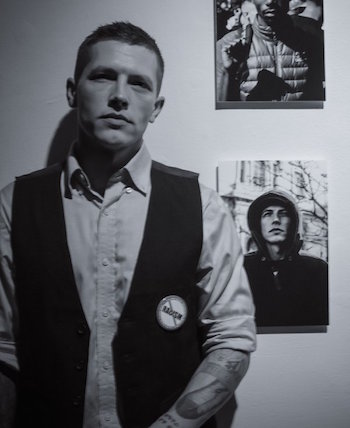Police Reformer Slams Top CPD Superintendent Finalist For Saying Police Can Police Themselves
By Emma G. Gallegos in News on Mar 18, 2016 7:07PM

Michael A. Wood Jr. (Twitter)
And now he's speaking out against the finalists for the top spot in the Chicago Police Department.
Wood retired from the force as a sergeant in 2014, and he has been studying for his PhD in the meantime while speaking out against police brutality and racism. But when Chicago Police Superintendent Garry McCarthy's spot opened up, he decided to apply (and he even shared his resume and essays). He had no expectation of even becoming a finalist, and he even placed his bets on who they might be.
He was disturbed to see that one finalist—Anne Kirkpatrick, the retired police chief of Spokane, Washington—was espousing the virtues of broken windows policing and suggesting that cops police themselves. These were the two questions asked by DNAInfo that gave Wood pause:
Q: Chicago has tried a number of strategies to reduce the rate of shootings, homicides and other serious violent crimes. What are the most effective methods of achieving reduction in these categories?Kirkpatrick: "In 1994, Commissioner Bill Bratton accomplished a turnaround of an epidemic crime problem in New York City by implementing the Broken Windows theory to crime fighting. ... The theory was "that untended disorder and minor offenses give rise to serious crime and urban decay." Based on that theory, Bratton took a zero tolerance position on quality of life crimes, and New York saw an astonishing drop in violent crimes. If I am selected as the next Superintendent of Police, I would go back to basics and implement those practices that we know work."
Q: What does accountability mean in the context of policing?"As a former chief of police, my mantra was that we are in the business of regulating other people's conduct, so I expect us (the police) to regulate our own conduct. ... At times, corrective action includes termination in order to maintain a highly effective and well-run organization."
This over me? Kirkpatrick wants broken Windows return & police can police themselves? https://t.co/YmIls4F95E pic.twitter.com/ZyisB2cIWQ
— Michael A. Wood Jr. (@MichaelAWoodJr) March 18, 2016
I never expected to be a finalist, but you chose Broken Windows Policing???? Really??? Really????
— Michael A. Wood Jr. (@MichaelAWoodJr) March 18, 2016
The broken windows theory of policing became popular in the 1990s. The theory was that cracking down on smaller crimes, like vandalism, public urination or skipping out on subway fare was necessary to preserve the social order and keep petty crime from escalating. The city that took up this theory and ran with it was New York City. Critics say that the theory isn't effective, and in practice it can be racist (like New York's since-reformed stop-and-frisk practice) and end up criminalizing the poor and homeless.
Kirkpatrick is one of three finalists for CPD Superintendent. The other two are Cedric Alexander, who is the Deputy Chief Operating Officer of Public Safety in DeKalb County, Georgia. Eugene Williams is the internal finalist: he's CPD’s Deputy Police Superintendent.